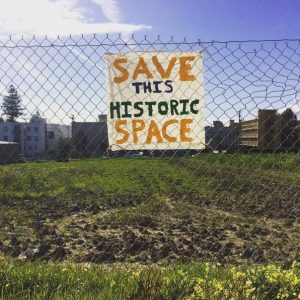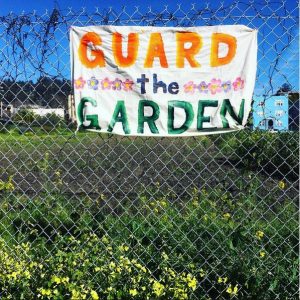The Student Organic Garden Association (SOGA) and Oxford Tract (OT) is battling the UC Berkeley’s Housing Initiative, headed by Chancellor Carol Christ, for future student housing development. In January 2017, the UCB Housing Master Plan Task Force released an official draft report that “offers a comprehensive and compelling discussion of the issues, as well as a menu of options that could significantly expand the availability of housing for Berkeley’s students and faculty by 2020.” (Christ, 2018). This report outlined the nine potential sites for housing development, such as Albany Village, Richmond Field Station, People’s Park, and Oxford Tract.
Proposed OT Development Plans
Oxford Tract, on which SOGA is located, is estimated to house the largest amount of student residents (undergrads and grads alike), where an estimated range of ~1,000-3,000 beds are set to be housed within the Ohlone/UCB land. The following year on February 2018, Chancellor Christ tasked the Oxford Tract Planning Committee to release a report on the fiscal costs and alternatives of relocating all the OT facilities, where the OTPC reached consensus that the relocation of SOGA to the UC Gill Tract Farm “would pose insurmountable logistical challenges for students (detrimental to the activities and programs supported by the garden and field) and hence is not a viable option.” (OTPC, 2018). Although the report clarifies that SOGA will be safe from development, the OT will be broken into separate facilities and be relocated onto different alternative garden spaces (OTPC, 2018). The report also states that housing will be in private, public partnerships and ultimately, unaffordable, and these costly projects won’t relieve the housing crisis if they are not affordable to Cal’s marginalized community members (HMPTF, 2017).
Housing is undeniably a top priority to the university, and members of OT and SOGA support new housing development for students who need more affordable living spaces within Berkeley’s inflated housing market. However, the UCB’s Housing Initiative’s framing of the OT as one of the last potential sites for student housing is extremely contrived and criminal, as there are multiple alternative housing sites that are can house the estimated same amount of student residents in SOGA’s report to the OTPC. The University has an extensive track record of using contemporary disparities, such as affordable housing storages, as scapegoats to mismanaging funding for monetary value and promotion (Asimov and Ravani, 2019). Renovating Memorial Stadium ($321 million), building a student-athletes only pool ($15 million), and generally, overfunding sports in Cal while dismissing the funding of the most impacted and marginalized Cal community members with Basic Needs ASUC and taking away campus resources like the OT should be considered an environmental injustice within the UCB system. OT should not be held as collateral damage for the University’s irresponsible choices to prioritize their capital before the public good.
History of OT and SOGA’s Significance
The OT is a historically significant space where agro-ecology and genetics became institutionalized as a form of scientific research. During the 1930’s, Barbara McClintock utilized the Oxford Research Tract, as well as SOGA, for research on genetics through maize experiments, where she discovered the undeniable conclusion that genes moved around on the chromosome (McClintock, 1983). This scientific discovery called into question the fundamental disciplines of genetics, and this resulted in her employment, research, and funding to be taken away and forced relocation upon her (Friedlander, 2002). As future geneticists received credit for similar findings Barbara had years before, she claimed that gender bias was the reason that her original discovery was faced with such opposition, and her discovery was later restored and awarded to her discipline (Friedlander, 2002). The OT should be commemorated as a public space where not only this type of scientific research was first successful in an oppressive, instrumentalist field, but also a crucial step into overcoming the utilitarian patriarchy of science as a career or research practice.
OT and SOGA Sustains Bay-area Community Members
OT and SOGA also represent a unique and increasingly rare space for agricultural researchers, students, and community members to engage in hands-on learning and gain agricultural knowledge in an urban context. The OT is home to a remarkable coalition of projects, serving 11 on-campus organizations, 40 faculty, multiple student organizations, a native bee habitat, and more. In particular, the OT is a serious hub for addressing food insecurity at Berkeley, helping sustain a network of campus farms and gardens that collectively grew 19,508 pounds of free, organic produce last year (OTPC, 2018). Donations from these sources to the UC Berkeley Food Pantry accounted for 49% of their fresh vegetables, serving 3,893 students and staff last fall (BFI, 2018). According to Berkeley Food Institute, 39 percent undergraduates and 23 percent of graduate students experience food insecurity at UC Berkeley, estimating to a staggering 14,000 Berkeley students (BFI, 2018). The instructional and educational aspect of this work cannot be understated, with participation from 10 instructional and decal classes a well. OT is also crucial to Berkeley’s support of environmental justice, as the site supports the Sogorea Te’ Land Trust, the Black Earth Farming Collective, the Sustainable Campus Landscaping Decal, and the Indigenous and Native Student Coalition (INC), all led by indigenous and students of color. Ensuring campus housing and food security depends on the accessibility of open field space and both could be readily expanded with future campus support.
SOGA is especially rare as it is a completely student-run garden where members have autonomy and creative freedom in their farming endeavor. SOGA provides a safe space for Bay-area community members and students alike to come together and collaborate on a self-determined and self-sufficient garden space that sustains community engagement, environmental justice, and food security. SOGA remains to be the last public space near campus where students can practice organic agro-ecology and conduct independent research, free from university-led commodification and capitalist interest. This is not an affordable housing crisis, but the loss of public spaces where students can produce and share their own means of production and subsistence. Our livelihoods are at stake over the affirmation of OT housing development, going against everything Chancellor Christ and UCB officials advocates for.
To stay engaged with Defend Oxford Tract, join the mailing list defendoxfordtract@gmail.com to be updated on the battle to defend accesses to urban agriculture, public educational spaces, scientific research, agro-ecology, food sovereignty, and indigenous coalition building within the Berkeley community.

